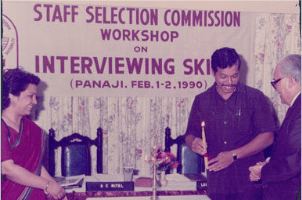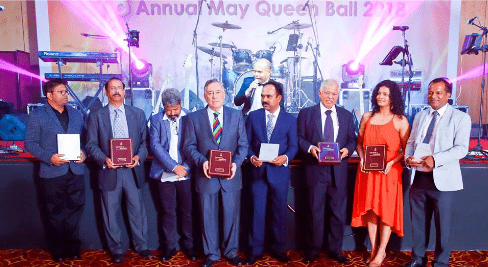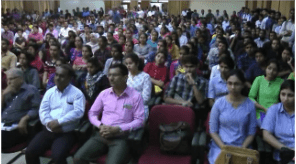EMPLOYMENT POLICY
A Decent Livelihood for every Goan
EMPLOYMENT POLICY
“Inspired by the cry of Dr. Jack Sequeira to send back deputationists, I wanted to link “Jobs for Goans” and “Konkani language”. I was always thinking about different ways that would protect the interests of Goans. I realised that this could be concretised through compulsory domicile in Goa and compulsory knowledge of Konkani. I made these requirements compulsory for jobs in Departments under me. Even in the employment exchange I made 15 years domicile compulsory. “

Mr. Luizinho Faleiro inaugurating an Interviewing Skills workshop as Labour Minister, 1990
Luizinho Faleiro always felt that the officers coming from outside Goa, were generally akin to tourists, showing little involvement and therefore policy implementation and development suffered.
He takes great pride, for introducing reservation for Goans in Government service, since previously most government servants, right from Goa Civil Service(BDOs, Mamlatdars, Deputy Collectors and Directors/Heads of Departments) to IAS officers, etc, were non Goans. Today if the Goan bureaucracy is almost 100 percent Goan, the credit should go to Luizinho Faleiro for his shrewd, tactical ‘Pro-Goan, Pro-Sons of the Soil’ move in employment.
He takes great pride, for introducing reservation for Goans in Government service, since previously most government servants, right from Goa Civil Service(BDOs, Mamlatdars, Deputy Collectors and Directors/Heads of Departments) to IAS officers, etc, were non Goans. Today if the Goan bureaucracy is almost 100 percent Goan, the credit should go to Luizinho Faleiro for his shrewd, tactical ‘Pro-Goan, Pro-Sons of the Soil’ move in employment.
AIMS AND STRATEGY OF THE POLICY
Labour Minister Luizinho Faleiro’s draft Employment Policy of 15th August 1991, not only promised ‘Right to Work’ but also ‘Right to Employment’ and a life of dignity and self respect for youth. The policy also envisaged ‘Employment for all by 2001″, with the thrust ‘Minimise Constraints And Maximise Opportunities’.
Reservation for Goans in government service
Luizinho Faleiro always felt that the officers coming from outside Goa, were generally akin to tourists, showing little involvement and therefore policy implementation and development suffered.
He takes great pride, for introducing reservation for Goans in Government service, since previously most government servants, right from Goa Civil Service(BDOs, Mamlatdars, Deputy Collectors and Directors/Heads of Departments) to IAS officers, etc, were non Goans. Today if the Goan bureaucracy is almost 100 percent Goan, the credit should go to Luizinho Faleiro for his shrewd, tactical ‘Pro-Goan, Pro-Sons of the Soil’ move in employment.
He takes great pride, for introducing reservation for Goans in Government service, since previously most government servants, right from Goa Civil Service(BDOs, Mamlatdars, Deputy Collectors and Directors/Heads of Departments) to IAS officers, etc, were non Goans. Today if the Goan bureaucracy is almost 100 percent Goan, the credit should go to Luizinho Faleiro for his shrewd, tactical ‘Pro-Goan, Pro-Sons of the Soil’ move in employment.
Reservation for Goans in industry
Thereafter, Luizinho Faleiro made 80% reservation for Goans in Private Enterprises by issuing a Cabinet Notification. Here too, 15 year domicile and working knowledge of Konkani were made compulsory. Conversely, Entrepreneurs were given incentives, if they recruited 80% Goans as certified by Department of Labour.
They were
- Prompt 24 hour provisional registration for their units
- Rs 15000 per year, for every Goan youth employed in their enterprise, which amounted to Rs 60,000 for four years.
- Income Tax Holiday for 5 years
- 25% subsidy of capital investment
- Sales Tax Holiday for 15 years.
Buttressing Agriculture
Luizinho, a votary of self employment, tailored the Employment Policy to ramp up jobs in the agriculture sector with agro based industrial activities, food processing, etc. He sought to change the mindset of the youth to create a new culture by taking to agriculture in a profitable way.
Nurturing Start-Ups
The employment policy also encouraged entrepreneurial activities by floating various schemes, including loans for Start Ups, with support from Banks and financial institutions, roped in for the purpose. To decrease dependency on Government jobs, the policy allowed government servants to keep lien on their jobs and seek Overseas employment.
Overseas Employees Corporation
would guide and help Goans to get remunerative employment overseas and avoid getting cheated by agents.

Mr. Luizinho Faleiro at the Goan Welfare Association May Queen Ball 2018 at Doha, Qatar
A Non Resident Goans Corporation was mooted to promote NRI investments in Goa, to improve the lot of their village, Goan youth and their own state itself.
Migrant Labour: The policy sought to regulate migrant labour through compulsory registration, regulation of their living conditions, mandatory health check up and making them the sole responsibility of the employer. Contract labour was to be eventually phased out since it led to exploitation of labour.

The Employment Exchange was to be trifurcated and computerised and all companies had to compulsorily intimate vacancies to it and seek applications from them.
Skill Training and strengthening of Technical Education was to be done to create gainful employment for youth by devising courses and syllabi, based on employment projections. The directorate would supervise vocational education in private college, do career counselling, and liaison with employers for placements of job seekers.
Manpower Development Cell: In order to train Goan employees in Hotel Management, Pharmaceutical and electronics, Luizinho Faleiro formed the Manpower Development Cell. Massive number of employees were trained. Unfortunately, all these initiatives collapsed after Luizinho’s government fell.
OBCs And Women Corporations were created to help them to plan and promote agro based industries; augment storage, marketing and processing facilities so as to generate employment and eliminate rural indebtedness. Additionally, the Women’s Corporation would focus on socio-economic advancement of women; by helping to procure, supply, distribute, agricultural produce; promote finished products and issue bonds and debentures all to improve the lot of women.
The Land Army Corporation: A first of its kind initiative –The Land Army Corporation, mooted by Luizinho Faleiro’s was to involve youth in the building of a Better Goa. It would facilitate interim employment for unemployed, inculcate discipline among youth and give them preference in government jobs. This scheme was adopted by later governments under a different name.
Manpower Development Cell: In order to train Goan employees in Hotel Management, Pharmaceutical and electronics, Luizinho Faleiro formed the Manpower Development Cell. Massive number of employees were trained. Unfortunately, all these initiatives collapsed after Luizinho’s government fell.
OBCs And Women Corporations were created to help them to plan and promote agro based industries; augment storage, marketing and processing facilities so as to generate employment and eliminate rural indebtedness. Additionally, the Women’s Corporation would focus on socio-economic advancement of women; by helping to procure, supply, distribute, agricultural produce; promote finished products and issue bonds and debentures all to improve the lot of women.
The Land Army Corporation: A first of its kind initiative –The Land Army Corporation, mooted by Luizinho Faleiro’s was to involve youth in the building of a Better Goa. It would facilitate interim employment for unemployed, inculcate discipline among youth and give them preference in government jobs. This scheme was adopted by later governments under a different name.
Unemployment Assistance: The Employment Policy even made provisions for Unemployment Assistance through the Goa ‘Unemployment Assistance and Self Employment Scheme Bill 1991,’ for four years, monthly allowance for those registered and the option to avail of self employment schemes contemplated in the bill. Besides the Goa University was asked to prepare students for Civil Services examinations and design their own courses with employment potential.
Companies and Industries were to become partners in employment generation. They were to be registered to avail of full benefits of Central taxes paid by them.
Luizinho Faleiro’s Employment Policy was to form the basis of all development plans and contribute to clearer enumeration of the Industrial Policy which ought to take into account the skills, aptitude of local youth and equip the youth for the future with skill requirement for the next one to 10 years. The Employment Policy of 1991 believed that the greatest investment in the future of Goa, was in its youth and the Right to Employment would enable youth to see themselves as assets not only to their family, and State, but even to their Country, India. This policy had the potential to solve many of the lingering problems that Goa faces till date.
Manpower Fairs: Luizinho Faleiro also organised Manpower Fairs through his Labour department where educationists, captains of industry, unemployed youth and other stakeholders such as managements were called. Careers fairs were also organised in collaboration with the hotel industry, Goa Chamber of Commerce and Industry, Small Scale Industries and Department of Art and Culture. Two representatives from each school would participate in such fairs and then go back and train other teachers in career counseling. These fairs were held across Goa through various exhibitions such as Goa Vision, Golden Jubilee of the Independence of India Fair etc.
Companies and Industries were to become partners in employment generation. They were to be registered to avail of full benefits of Central taxes paid by them.
Luizinho Faleiro’s Employment Policy was to form the basis of all development plans and contribute to clearer enumeration of the Industrial Policy which ought to take into account the skills, aptitude of local youth and equip the youth for the future with skill requirement for the next one to 10 years. The Employment Policy of 1991 believed that the greatest investment in the future of Goa, was in its youth and the Right to Employment would enable youth to see themselves as assets not only to their family, and State, but even to their Country, India. This policy had the potential to solve many of the lingering problems that Goa faces till date.
Manpower Fairs: Luizinho Faleiro also organised Manpower Fairs through his Labour department where educationists, captains of industry, unemployed youth and other stakeholders such as managements were called. Careers fairs were also organised in collaboration with the hotel industry, Goa Chamber of Commerce and Industry, Small Scale Industries and Department of Art and Culture. Two representatives from each school would participate in such fairs and then go back and train other teachers in career counseling. These fairs were held across Goa through various exhibitions such as Goa Vision, Golden Jubilee of the Independence of India Fair etc.
EMPLOYMENT POLICY Book
Please wait while flipbook is loading. For more related info, FAQs and issues please refer to DearFlip WordPress Flipbook Plugin Help documentation.